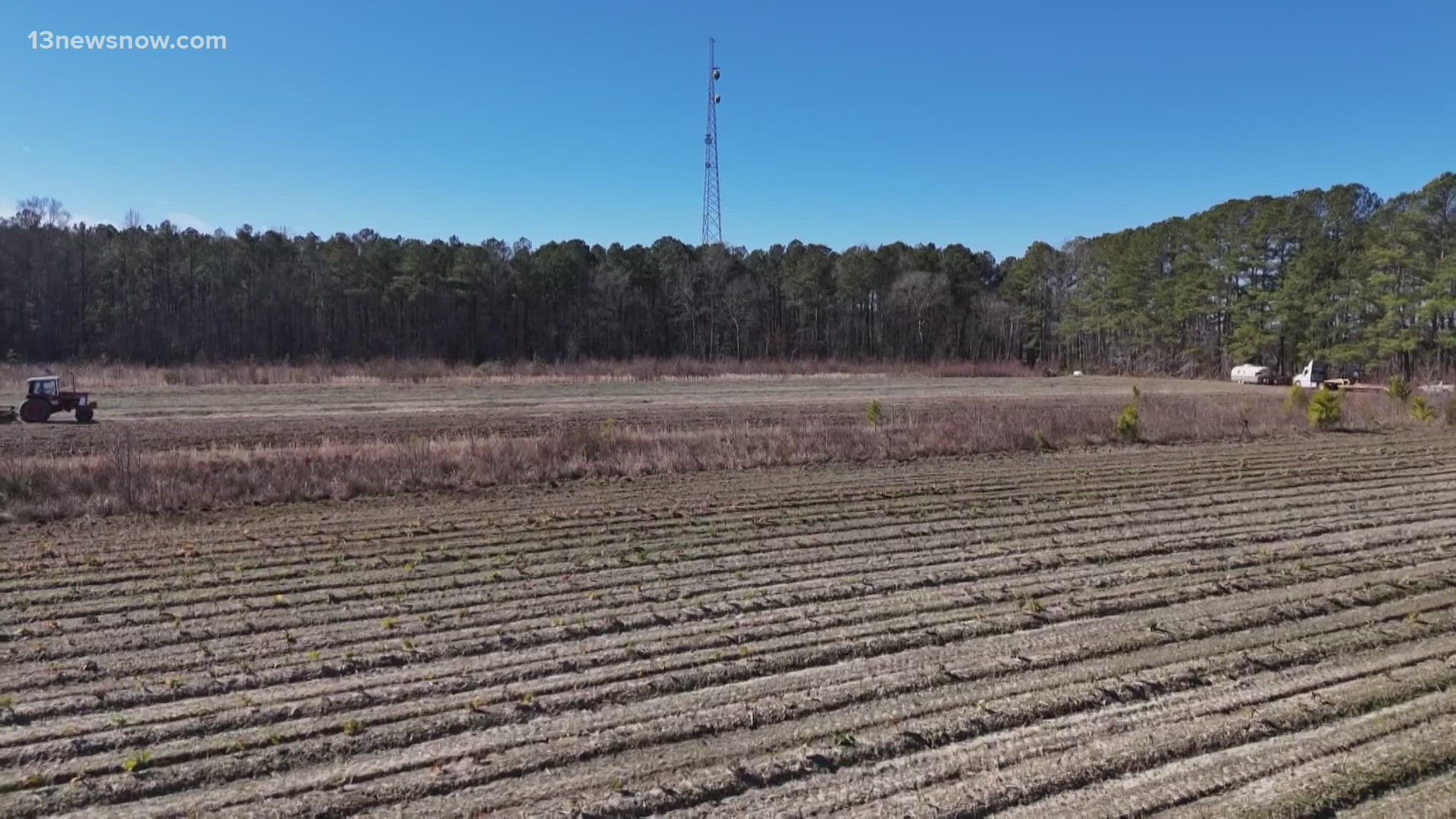SOUTHAMPTON COUNTY, Va. — A unique partnership is fighting hunger in Hampton Roads. A food bank, a church and one local Black farmer are teaming up to feed thousands of people in need.
How a Southampton County farmer began working with the Hampton Roads-based Foodbank
Every morning, bright and early, Elisha Barnes gets up to do what he loves.
“I get to play in the dirt! A lot of people call it work, but I am not working," Barnes told 13News Now.
Based in Southampton County, Barnes is a fourth-generation peanut farmer who likes to do things the old-fashioned way. He is the owner of Pop Son Farm, and among a small percentage of Black farmers in Virginia and the U.S.
Above all, he's passionate about feeding others.
“Everybody still has to eat," Barnes said.
But not everyone has access to healthy food, especially fresh produce.
It's something Chris Tan works hard to solve as president and CEO of the Foodbank of Southeastern Virginia and the Eastern Shore. Last year, he came up with a plan to tackle food insecurity and asked Barnes for help.
"The food bank knows a lot about distributing food. We don’t know a lot about growing food," Tan said.
The idea is simple: The food bank provides the land and supplies, and Barnes grows the food. He keeps half and donates the rest to the Foodbank, which then goes out to feed people in need.
"Elisha and I shook hands and that’s the only deal we’ve ever made with each other," said Tan.
Something else was important to Tan: He wanted to support a local Black farmer, a group that's dwindled across the country over the last century.
In 2014, a U.S. Census of Agriculture report showed Black farmers were 1.4% of the country's 3.2 million farmers in 2012.
“We know that in 1920, 13% of farms were owned by African-American farmers, and now it’s 1%," said Tan. "It’s really about taking the needs of an African American farmer and helping him keep his business going, but also allowing his skills to help the community.”
A Hampton Roads church offered land for farmland. It became 'Izzie's Field.'
With a plan in place, they needed land. A local church heard the idea and wanted to help.
The members of New Life Church Global, led by senior pastor Rev. Eric Majette, offered a 20-acre field for the project. The property is located near the intersection of Southampton Parkway and Camp Parkway in Courtland.
The site of this one-of-a-kind pilot program is now named, "Izzie's Field," after a beloved Foodbank employee who wrote the grant for the initiative and died before the idea fully came into fruition.
"We knew there was a purpose for this land. We just weren't sure what it was," said Faith Bridges, an executive pastor for New Life Church Global.
Bridges’ father and New Life’s founding pastor, Dr. William Saunders, purchased nearly 60 acres of land nearly 25 years ago with hopes of using it to help the community.
Majette and Bridges say the church shares a special focus on eradicating food insecurity and has worked with the Foodbank as a distributor in the past. Majette cited the Western Tidewater area as being among the commonwealth's worst for diabetes rates.
They've been waiting for an opportunity like this.
"It completes the puzzle," said Bridges. "So when you look at New Life Church, you look at the Foodbank, you look at Elijah Barnes - the three pieces come together and form a whole because we are all aligned in what we are trying to do.”
"We are here to fill gaps. We're here to be able to help the community fill some gaps that the community needs," said Majette.
In the summer of 2023, Barnes said the farm produced more than 38,000 pounds of sweet corn for the Foodbank. Last August, volunteers helped distribute fresh food to nearly 200 agencies across Hampton Roads.
“And there are those that may not appreciate it because it seems like it’s a throwback to a time when things were not quite as pleasant," said Barnes.
A modern twist to an old practice: 'It heals a lot of wounds'
Sharecropping became more popular after the Civil War, allowing farmers to work on land they did not own in exchange for a share of the crop. But Black sharecroppers, like Barnes' father, were often mistreated.
"He never owned anything, and every year when it came time to ‘settle up,’ he never quite made it," said Barnes.
Today, Barnes owns multiple farms, including where his father once worked, and he says this partnership is a sign of a new day.
"It heals a lot of wounds that have existed for so long," said Barnes.
This year, Barnes and the Foodbank plan to plant even more crops, including watermelon and cantaloupe. It's more work, but it's also more food on people's plates.
"It's those kinds of things that just keep waking me up with a new joy to do this every single day," he said.
Barnes and the leaders at the Foodbank of Southeastern Virginia and the Eastern Shore say they need volunteers for the next harvest. To find more information about volunteer efforts, click here.

